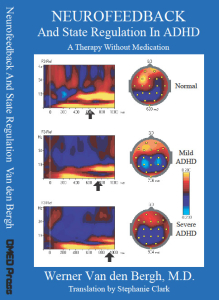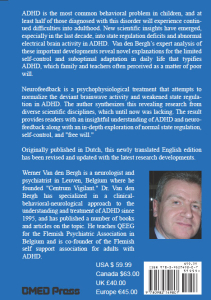Neuropsychiatrist Investigates Attention Deficit Hyperactivity Disorder (ADHD) and Its Treatment with Neurofeedback in New, Innovative Book
Werner Van den Bergh, M.D, a neurologist and neuropsychiatrist, provides an advanced, in-depth exploration of Attention Deficit Hyperactivity Disorder (ADHD) and its treatment with neurofeedback in a new innovative book.
Corpus Christi, TX, January 13, 2011 --(PR.com)-- BMED Press is pleased to announce the release of the book, “Neurofeedback and State Regulation in ADHD: A Therapy Without Medication,” by Werner Van den Bergh, MD with translation by Stephanie Clark.
Dr. Van den Bergh provides an advanced, in-depth exploration of Attention Deficit Hyperactivity Disorder (ADHD) and its treatment with neurofeedback. The author synthesizes new scientific insights into state regulation deficits and abnormal electrical brain activity that characterize ADHD. Neurofeedback, also known as EEG-biofeedback, is a psychophysiological treatment that attempts to normalize deviant brainwave activity through operant conditioning procedures.
Dr. Van den Bergh is a Belgium neurologist and neuropsychiatrist who uses neurofeedback on a daily basis in the treatment of pediatric and adult ADHD. He describes his inspiration to write this innovative book as, “The Berlin psychiatry school of the EEG vigilance model has especially fascinated me for more than 20 years. Similar dynamic ideas of global EEG spectrum changes have also been described in one study by Sterman in 1980, but have never been completely adapted in the neurofeedback field, which generally is still too data-driven. The goal of my book was to reawaken these early profound insights and to offer a broader perspective to the neurofeedback field which, in my opinion, is still lacking.”
The discovery that sleep disturbances play a fundamental role in ADHD represents another accomplishment of this unique book. Specifically, the author reveals that children with ADHD display EEG brainwave patterns similar to healthy people who are sleep deprived. These factors explain why children with ADHD have limited self-control and suboptimal adaptation in daily life, which family and teachers often perceive as a matter of poor “willpower.”
Over time, the sleep disorder components of ADHD have been ignored, says Dr. Van den Bergh. He adds that, “…sleep deprivation is known to create a ‘frontal-like syndrome,’ similar to ADHD, and sleep deprivation was a model for decreased vigilance in the Berlin EEG vigilance model. This Berlin school model is not well known in the United States and has its roots in European neuropsychiatry.”
Dr. Van den Bergh discusses at length how neurofeedback can improve these underlying state regulation deficits and why neurofeedback may be a powerful, medication-free treatment for many people with ADHD.
Other topics that receive considerable attention include EEG mechanisms of attention and self-regulation, SMR-neurofeedback, tomographic (LORETA) 3D neurofeedback, and slow cortical potentials (SCP) neurofeedback.
Dr. Van den Bergh hopes that his writings bring a newfound awareness of these important neurophysiological factors in ADHD as well as medication-free treatment options, especially in the United States.
Neurofeedback and State Regulation in ADHD: A Therapy Without Medication (ISBN: 9780982749807) is available from all major internet retailers and direct from BMED Press: http://www.bmedpress.com/store/books/neurofeedback-state-regulation-adhd-book
The complete interview with Dr. Van den Bergh is here: http://www.bmedpress.com/archives/1663
###
Dr. Van den Bergh provides an advanced, in-depth exploration of Attention Deficit Hyperactivity Disorder (ADHD) and its treatment with neurofeedback. The author synthesizes new scientific insights into state regulation deficits and abnormal electrical brain activity that characterize ADHD. Neurofeedback, also known as EEG-biofeedback, is a psychophysiological treatment that attempts to normalize deviant brainwave activity through operant conditioning procedures.
Dr. Van den Bergh is a Belgium neurologist and neuropsychiatrist who uses neurofeedback on a daily basis in the treatment of pediatric and adult ADHD. He describes his inspiration to write this innovative book as, “The Berlin psychiatry school of the EEG vigilance model has especially fascinated me for more than 20 years. Similar dynamic ideas of global EEG spectrum changes have also been described in one study by Sterman in 1980, but have never been completely adapted in the neurofeedback field, which generally is still too data-driven. The goal of my book was to reawaken these early profound insights and to offer a broader perspective to the neurofeedback field which, in my opinion, is still lacking.”
The discovery that sleep disturbances play a fundamental role in ADHD represents another accomplishment of this unique book. Specifically, the author reveals that children with ADHD display EEG brainwave patterns similar to healthy people who are sleep deprived. These factors explain why children with ADHD have limited self-control and suboptimal adaptation in daily life, which family and teachers often perceive as a matter of poor “willpower.”
Over time, the sleep disorder components of ADHD have been ignored, says Dr. Van den Bergh. He adds that, “…sleep deprivation is known to create a ‘frontal-like syndrome,’ similar to ADHD, and sleep deprivation was a model for decreased vigilance in the Berlin EEG vigilance model. This Berlin school model is not well known in the United States and has its roots in European neuropsychiatry.”
Dr. Van den Bergh discusses at length how neurofeedback can improve these underlying state regulation deficits and why neurofeedback may be a powerful, medication-free treatment for many people with ADHD.
Other topics that receive considerable attention include EEG mechanisms of attention and self-regulation, SMR-neurofeedback, tomographic (LORETA) 3D neurofeedback, and slow cortical potentials (SCP) neurofeedback.
Dr. Van den Bergh hopes that his writings bring a newfound awareness of these important neurophysiological factors in ADHD as well as medication-free treatment options, especially in the United States.
Neurofeedback and State Regulation in ADHD: A Therapy Without Medication (ISBN: 9780982749807) is available from all major internet retailers and direct from BMED Press: http://www.bmedpress.com/store/books/neurofeedback-state-regulation-adhd-book
The complete interview with Dr. Van den Bergh is here: http://www.bmedpress.com/archives/1663
###
Contact
BMED Press LLC
Christopher Fisher, PhD
817-400-1639
http://www.bmedpress.com
Christopher Fisher, PhD
817-400-1639
http://www.bmedpress.com
Multimedia

Front Book Cover
The front cover of the book.

Back Book Cover
The back cover of the book.
Categories
